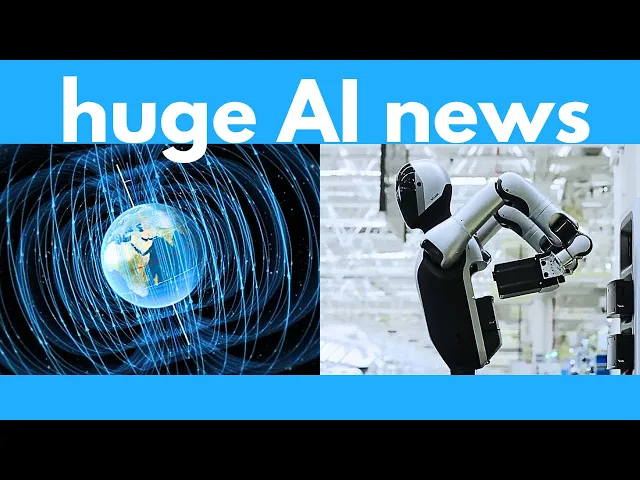New AI video model, AI operating system, self charging robots, ChatGPT Agent, Kimi K2

AI breakthroughs transforming our digital future
In the rapidly evolving landscape of artificial intelligence, keeping pace with breakthroughs can feel like chasing the horizon. The recent developments across video generation, operating systems, robotics, and language models represent not just incremental steps but transformative leaps that will reshape how businesses operate. These innovations signal a fundamental shift in how we'll interact with technology in our professional lives.
Key Developments
-
Sora and video generation models mark a paradigm shift in content creation, enabling the production of photorealistic videos from text prompts with unprecedented coherence and physical accuracy
-
Apple's potential AI operating system could fundamentally change our relationship with technology by creating a more intuitive, predictive computing environment that anticipates needs rather than waiting for commands
-
Self-charging robots from companies like Figure AI are overcoming one of robotics' fundamental limitations by harvesting environmental energy, potentially enabling persistent operation without human intervention
-
ChatGPT's agent functionality represents a significant evolution in AI assistance by enabling autonomous, goal-oriented action rather than simple query responses
-
Anthropic's Kimi K2 advances the frontier of AI reasoning capabilities with improvements in factual accuracy and complex problem-solving while reducing hallucination
The Real Revolution: AI as Autonomous Collaborator
The most profound insight from these developments isn't any single technology but their collective implication: AI is rapidly transitioning from tool to teammate. Consider ChatGPT's agent functionality—this shift from passive responder to active agent fundamentally changes the relationship between human and machine.
This matters enormously for businesses because it creates a new operational paradigm. Rather than AI tools that require constant human oversight and direction, we're entering an era where AI systems can understand objectives, develop plans, and execute complex sequences of actions. This represents not just automation of tasks but automation of entire processes and workflows.
The economic implications are substantial. McKinsey estimates that generative AI could add $2.6-4.4 trillion annually to the global economy across industries. But this new value creation depends on businesses recognizing that tomorrow's AI isn't just today's AI with better performance—it's a fundamentally different category of technology with different integration requirements and organizational impacts.
Beyond the Video: The Integration Challenge
What the video
Recent Videos
How To Earn MONEY With Images (No Bullsh*t)
Smart earnings from your image collection In today's digital economy, passive income streams have become increasingly accessible to creators with various skill sets. A recent YouTube video cuts through the hype to explore legitimate ways photographers, designers, and even casual smartphone users can monetize their image collections. The strategies outlined don't rely on unrealistic promises or complicated schemes—instead, they focus on established marketplaces with proven revenue potential for image creators. Key Points Stock photography platforms like Shutterstock, Adobe Stock, and Getty Images remain viable income sources when you understand their specific requirements and optimize your submissions accordingly. Specialized marketplaces focusing...
Oct 3, 2025New SHAPE SHIFTING AI Robot Is Freaking People Out
Liquid robots will change everything In the quiet labs of Carnegie Mellon University, scientists have created something that feels plucked from science fiction—a magnetic slime robot that can transform between liquid and solid states, slipping through tight spaces before reassembling on the other side. This technology, showcased in a recent YouTube video, represents a significant leap beyond traditional robotics into a realm where machines mimic not just animal movements, but their fundamental physical properties. While the internet might be buzzing with dystopian concerns about "shape-shifting terminators," the reality offers far more promising applications that could revolutionize medicine, rescue operations, and...
Oct 3, 2025How To Do Homeless AI Tiktok Trend (Tiktok Homeless AI Tutorial)
AI homeless trend raises ethical concerns In an era where social media trends evolve faster than we can comprehend them, TikTok's "homeless AI" trend has sparked both creative engagement and serious ethical questions. The trend, which involves using AI to transform ordinary photos into images depicting homelessness, has rapidly gained traction across the platform, with creators eagerly jumping on board to showcase their digital transformations. While the technical process is relatively straightforward, the implications of digitally "becoming homeless" for entertainment deserve careful consideration. The video tutorial provides a step-by-step guide on creating these AI-generated images, explaining how users can transform...
